Review: Broadway's MJ Is an Insanely Entertaining Tribute to Michael Jackson
Myles Frost plays Michael Jackson in a Tony-worthy performance.
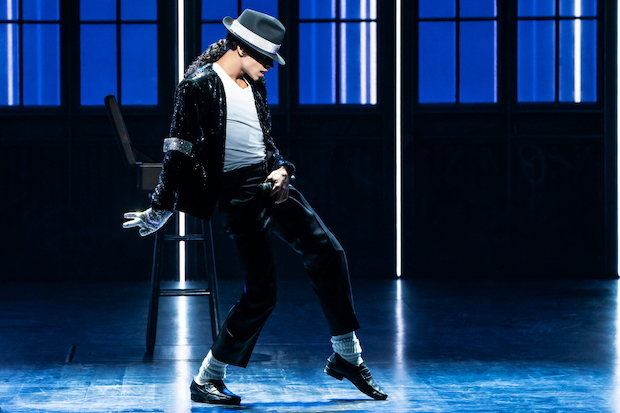
(© Matthew Murphy)
Michael Jackson is a human Rorschach test: Where some see the greatest pop artist of all time, others see an entertainer raised in captivity and completely divorced from reality. Still others might obsess about his cosmetic surgery, a triumph of art over nature undoubtedly rooted in insecurity and made possible by nearly limitless resources. Some might even see him as the Cassandra of our present condition: The press once laughed at his surgical masks, but now we all wear them (at least, inside a Broadway theater). And then there are the darker allegations that those who believe survivors feel duty-bound to validate.
With so many wildly divergent angles from which to approach the story of the late King of Pop, it should shock no one that playwright Lynn Nottage, director Christopher Wheeldon, and the rest of the team behind MJ, the new musical at Broadway's Neil Simon Theatre, have settled on the least contested: Michael Jackson's music is irresistible, and it is best when performed before a live audience by musicians and dancers who know how to burn the house down.
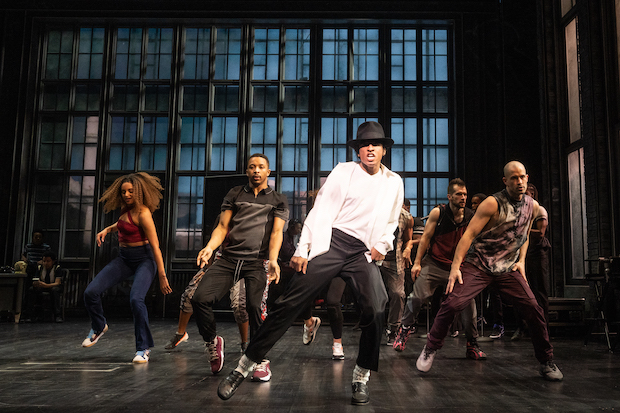
(© Matthew Murphy)
The tone of the show is set before the first note is ever played: Dancers wander onto the stage and warm-up as the audience enters. A stage manager warns that we have "five minutes to Michael" as the excitement builds. When MJ (Myles Frost) finally does enter, he is greeted by the audience as if he really is Michael Jackson reincarnated (which, after witnessing his spot-on performance, he just might be). The cast quickly launches into a supercharged performance of "Beat It" and the crowd goes nuts.
Rather than attempting to present a chronological staging of Jackson's biography (a fool's errand when it comes to the jukebox musical), MJ proceeds from the Brechtian conceit of its initial moments: The entire show takes place inside of a rehearsal for Jackson's 1992-93 ''Dangerous World Tour" (conveniently right before any sexual misconduct allegations came to light). The presence of a small camera crew from MTV (Whitney Bashor and Gabriel Ruiz) prompts Michael to reminisce as memories from the past fade in and out like backup vocals on a Motown track.
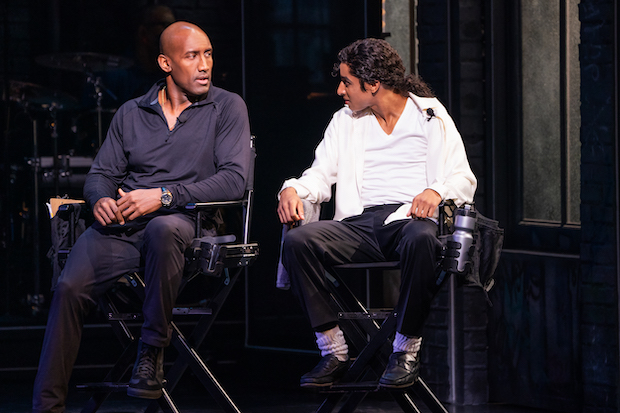
(© Matthew Murphy)
Little Michael (the extraordinary Christian Wilson at the performance I attended) emerges with his brothers from the shadows of time to perform a nifty medley of Jackson 5 songs. This montage propels the exposition, taking Michael from Indiana to California and the tutelage of Berry Gordy (Antoine L. Smith). An older Michael (Tavon Olds-Sample) breaks from the family band to produce solo albums like Off the Wall and Thriller with Quincy Jones (Apollo Levine). Michael sells millions of albums and wins eight Grammys — providing the justification for a particularly hilarious prop by Buist Bickley.
But the price of fame is steep as Michael contends with his demanding family and a ravenous press hungry for the next outrageous story about "Wacko Jacko" (this is the second musical of the season to feature a menacing chorus of reporters). All the while, Michael grapples with his own expectations of perfection as he strives to make "Dangerous" the greatest concert in history.
Dancers in the rehearsal room seamlessly transition into figures from Michael's life: The imposing Quentin Earl Darrington doubles as Rob (a manager) and Joseph Jackson, Michael's demanding and occasionally abusive father. Ayana George pulls our heartstrings in the dual roles of a backup singer in need of reliable childcare and Michael's mother, Katherine (her powerful rendition of "I'll Be There" is one of the highlights of the show). The story seems to spring naturally from the imagination of its subject, making MJ more artful (and therefore more watchable) than most musicals of its kind. Much credit should go to Nottage for that.
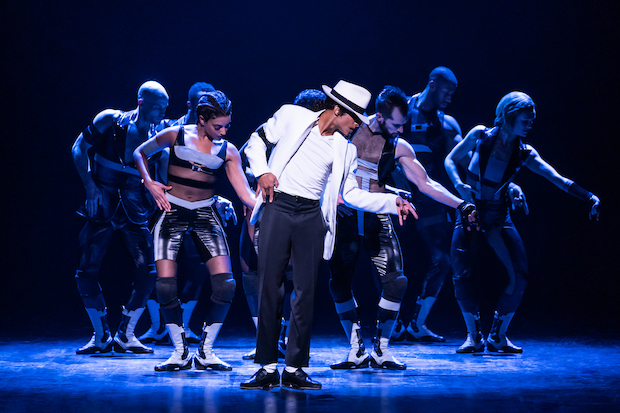
(© Matthew Murphy)
Wheeldon uses Nottage's script as a springboard for fast-paced and dynamic staging. His production numbers evoke Jackson's iconic music videos (how could they not?) while also bringing original choreography to the table. The result is the most impressive dancing on any Broadway stage right now. MJ cements Wheeldon's reputation as one of the great director-choreographers.
Derek McLane's scenic design is as versatile as Wheeldon's staging, while Paul Tazewell's detailed costumes facilitate some remarkable quick changes (as do Charles LaPointe's menagerie of period-specific wigs). Natasha Katz's lighting enhances the liquid feeling of the staging, delivering both intimate moments and explosive concert lighting. Peter Nigrini's projections work in tandem with the set and breathtakingly serve as a force multiplier for the dancers. During some of the most exciting production numbers, like "Thriller" and "Smooth Criminal," we can feel the music in our chests thanks to Gareth Owen's muscular sound design. This is as close as you can get to a Michael Jackson concert in a Broadway house.
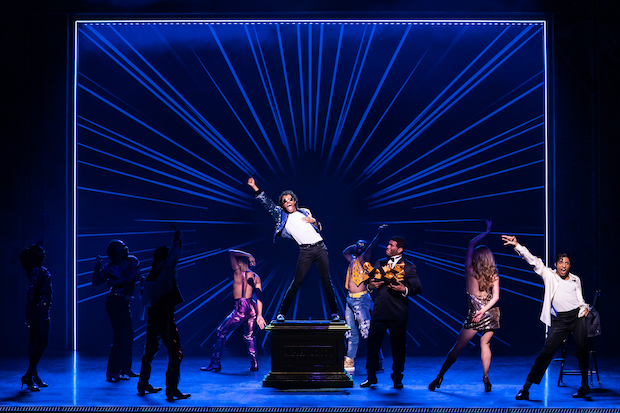
(© Matthew Murphy)
The most important factor supporting that is the lead actor: Like Adrienne Warren as Tina Turner before him, Frost seems to be channeling his subject, causing us to temporarily forget that we're seeing an actor at all. Olds-Sample is similarly convincing, taking on the role of Michael through much of the 1970s and early '80s and making us root for the skinny teenager who can't keep a song out of his mouth or a groove out of his body. Their performances are perfectly coordinated, and when they sing together, howling out dueling wooooos, it is pure joy.
Of course, there will always be people who find nothing enjoyable about Michael Jackson. They don't think such a problematic artist deserves a platform, and they will bristle at Nottage's propagandistic portrayal of Jackson as a kind of pop music E.T. — simultaneously wonderous and too fragile for our fallen world. MJ is not for them. Rather, it is for the millions of Michael Jackson fans whose fealty to the King of Pop remains unbroken, and who are eager to have a good time in a Broadway theater with songs they already know and love. They won't be disappointed by MJ. I suspect it's going to be a big fat hit.









